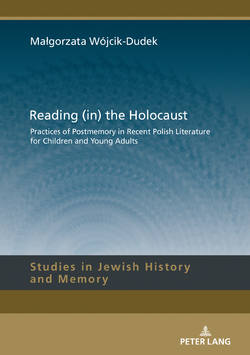Reading (in) the Holocaust

Реклама. ООО «ЛитРес», ИНН: 7719571260.
Оглавление
Malgorzata Wójcik-Dudek. Reading (in) the Holocaust
About the author
About the book
This eBook can be cited
Acknowledgements
Table of Contents
Chapter One Mount of Remembrance
The Predicament of Postmemory
Educational Practices vis-à-vis the Holocaust
The Polish School of Memory
The Ethical Challenge of Reading about the Holocaust at School, or on the Importance of Context
DS804.34 and PZ
The Faultlines of Memory
Chapter Two Jan Brzechwa’s Pan Kleks Series: An Alternative Reading. Games with Akademia pana Kleksa
Between the See-Saw and the Scaffold: 1946
Growing up, or “the Disenchantment of the World”?
An Academy or a Cheder?
א Aleph = Academy
What Is Erasure?
Younger Siblings of the Academy, or, on the Books That No One Reads
The Difficult Case of Tryumf pana Kleksa
The Fairy Tale that Does Not Uplift
Chapter Three The Architecture of Biography: The Case of Korczak. Between Memorials and Literature: From Mapping the City to Mapping Memory
The Year of Korczak, or on the Troublesome Invasion of Memory
From a Tactician to a Strategist: A Modern Take on Korczak
Chapter Four Micronarratives from the Peripheries of the Holocaust. Micronarratives and Counter-History, or on Overcoming Oppression
The Holocaust According to Anne Frank
Girls’ Narratives: Intimist Writing and the Holocaust
The Fairy Tale and the Holocaust
The Trap of Meanings
Chapter Five Motherhood in the State of Emergency. Between the Yiddishe Mame and Medeą
The Metonymy of Mother: The Sliska Street Case
The World without Mother: Patterns of Storytelling
Mother as a Pretext
Hunger/Satiety: Mother and Affect
When Mother Is Far Away
The Animal Point of View: Another Version of Motherhood386
Polish Mothers and the Rituals of Hospitality
Chapter Six Space Management and Postmemory. Sacred Landscape
Beautiful Deceit
Philosemitic Postmemory
Playing with Space
The Jewish Space
a) The Continuity of the Wall
b) Clearings of Truth
The Post-Jewish Space
Non-place: The Disneyland of Memory
Space Talks
Chapter Seven The Dybbuk Versus Facebook
The Dybbuk: A Case Study of Kotka Brygidy by Joanna Rudniańska
Facebook: A Case Study of Wszystkie lajki Marczuka by Paweł Beręsewicz
Close Strangers: An Attempt at a Conclusion
Bibliography
Index
Отрывок из книги
Małgorzata Wójcik-Dudek
Reading (in) the Holocaust
.....
2 Aleksandra Ubertowska, “Historia bez Ojca. Postmemorialne kobiece narracje o wojnie i Holokauście,” in Aleksandra Ubertowska, Holocaust: Auto(tanato)grafie (Warszawa: IBL, 2014), pp. 182–210, on p. 197. Throughout this book, quotations from non-English sources are provided in translation by the translator of this volume, if not indicated otherwise.
3 Written in 1938, “Locomotive” is an extremely popular children’s poem which set the standard of Polish poetry for children for many years. The rhythm, rhymes and onomatopoeic devices used in it perfectly capture the movement of a speeding train. The poem would later be referenced by Stanisław Wygodzki, a Polish poet of Jewish descent, who lost his wife and daughter in truly tragic circumstances (realising what was awaiting them at Auschwitz, all of them took luminal on the train from the Będzin ghetto to the camp; Wygodzki himself survived). His bitter poem “Locomotive,” which alludes to Tuwim’s popular pre-war text, is a heart-rending elegy for his lost child.
.....